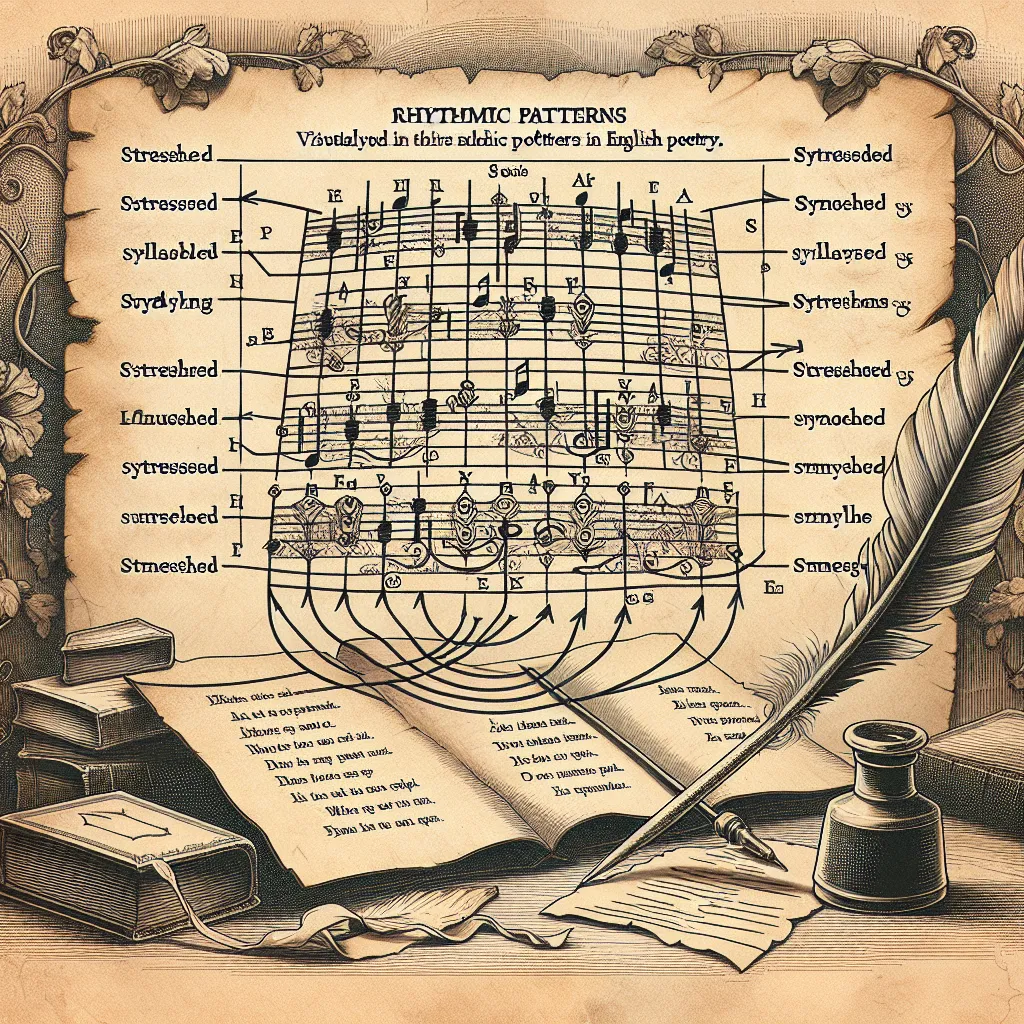English poetry is a powerful tool for enhancing pronunciation skills. Its rhythmic nature and emphasis on sound patterns make it an ideal medium for practicing and refining pronunciation. This guide will explore various techniques and strategies to leverage poetry for improved English pronunciation.
Understanding the Connection Between Poetry and Pronunciation
Poetry and pronunciation share a fundamental connection through the emphasis on sound, rhythm, and intonation. Poetry often highlights these aspects of language more prominently than prose, making it an excellent resource for pronunciation practice.
The Role of Rhythm and Meter
Rhythm and meter are crucial elements in both poetry and spoken English. By studying and reciting poetry, learners can develop a better sense of the natural cadence of English speech.
 English Poetry Rhythm
English Poetry Rhythm
For example, consider this line from Shakespeare’s Sonnet 18:
“Shall I compare thee to a summer’s day?”
The rhythm of this line, known as iambic pentameter, mirrors the natural stress patterns in English speech, helping learners internalize these patterns.
Phonetic Focus in Poetry
Poetry often employs phonetic devices such as alliteration, assonance, and consonance, which draw attention to specific sounds. These devices can be particularly useful for practicing challenging phonemes.
For instance, in the poem “The Prickle-eye Bush” by Anonymous:
“Prickle-eye bush, prickle-eye bush,
You prick my heart full sore;”
The repetition of the ‘pr’ sound helps learners focus on this specific consonant cluster.
Techniques for Using Poetry to Improve Pronunciation
1. Read Aloud Regularly
Reading poetry aloud is one of the most effective ways to improve pronunciation. It allows you to practice the sounds, rhythms, and intonation patterns of English in a structured format.
Tips for effective read-aloud practice:
- Start with shorter poems and gradually move to longer ones.
- Record yourself and compare your pronunciation to native speaker recordings.
- Focus on one aspect (e.g., vowel sounds, stress patterns) at a time.
2. Shadowing Technique
Shadowing involves listening to a native speaker recite a poem and repeating it simultaneously or with a slight delay. This technique helps improve not only pronunciation but also intonation and speech rhythm.
Steps for shadowing:
- Choose a poem and find a native speaker’s recording.
- Listen to the recording several times to familiarize yourself with the content.
- Begin shadowing by speaking along with the recording, focusing on matching the speaker’s pronunciation and rhythm.
- Gradually reduce the volume of the recording as you become more confident.
3. Focusing on Minimal Pairs
Many poems contain words that differ by only one sound (minimal pairs). Identifying and practicing these can help refine your ability to distinguish and produce similar sounds.
For example, in Robert Frost’s “Stopping by Woods on a Snowy Evening”:
“He gives his harness bells a shake
To ask if there is some mistake.”
The words “shake” and “mistake” form a minimal pair, differing only in the initial consonant sound.
4. Exploring Rhyme Schemes
Rhyme schemes in poetry can help learners focus on specific word endings and vowel sounds. By identifying rhyming words, you can practice producing similar sounds in different contexts.
Consider this excerpt from Emily Dickinson’s “Hope is the thing with feathers”:
“Hope is the thing with feathers
That perches in the soul,
And sings the tune without the words,
And never stops at all,”
The rhyme scheme (ABAB) highlights the similar sounds in “soul” and “all,” helping learners practice the long ‘o’ sound.
Common Pronunciation Challenges Addressed Through Poetry
1. Stress and Intonation
English poetry often emphasizes the natural stress patterns of words and phrases. By reciting poems, learners can internalize these patterns more effectively.
For instance, in William Wordsworth’s “I Wandered Lonely as a Cloud”:
“I wandered lonely as a cloud
That floats on high o’er vales and hills,”
The natural rhythm of the lines helps reinforce the stress patterns in words like “wandered” and “lonely.”
2. Consonant Clusters
Many poems contain words with challenging consonant clusters. Practicing these in the context of poetry can make them easier to pronounce.
In Percy Bysshe Shelley’s “Ozymandias”:
“Two vast and trunkless legs of stone
Stand in the desert…”
The word “trunkless” provides practice with the challenging ‘nkl’ consonant cluster.
3. Vowel Sounds
Poetry often plays with vowel sounds, providing ample opportunity to practice the diverse vowel phonemes in English.
For example, in John Keats’ “Ode on a Grecian Urn”:
“Thou still unravish’d bride of quietness,
Thou foster-child of silence and slow time,”
The varying vowel sounds in words like “still,” “unravish’d,” and “quietness” offer a range of practice opportunities.
The Phonemic Chart and Commonly Mispronounced Words
Understanding the International Phonetic Alphabet (IPA) and the English Phonemic Chart can greatly enhance your ability to improve pronunciation through poetry.
 English Phonemic Chart
English Phonemic Chart
Here are ten commonly mispronounced words often found in English poetry, along with their correct pronunciations:
- Wandered – /ˈwɒndəd/ (not /ˈwændərd/)
- Epitome – /ɪˈpɪtəmi/ (not /ˈɛpɪtoʊm/)
- Melancholy – /ˈmɛlənkəli/ (not /mɛlənˈkɒli/)
- Ethereal – /ɪˈθɪəriəl/ (not /ɛˈθɪriəl/)
- Reverie – /ˈrɛvəri/ (not /rɪˈvɛri/)
- Subtle – /ˈsʌtl/ (not /ˈsʌbtl/)
- Rhythm – /ˈrɪðəm/ (not /ˈrɪθəm/)
- Anemone – /əˈnɛməni/ (not /əˈnɛmoʊn/)
- Archipelago – /ˌɑːkɪˈpɛləɡəʊ/ (not /ɑːrʧɪˈpɛləɡoʊ/)
- Mischievous – /ˈmɪsʧɪvəs/ (not /mɪsˈʧiːviəs/)
Practice these words in the context of poems to improve your pronunciation accuracy.
Conclusion
Improving pronunciation through English poetry is an effective and enjoyable method for language learners. By engaging with the rhythms, sounds, and structures of poetry, you can enhance your overall pronunciation skills, developing a more natural and fluent speaking style.
Remember to practice regularly, focus on specific aspects of pronunciation, and don’t be afraid to experiment with different poems and techniques. With patience and persistence, you’ll find that poetry can be a powerful tool in your journey towards better English pronunciation.
For more tips on enhancing your English skills, check out our articles on how to improve pronunciation through reading aloud and how to master the rhythm of English speech.




